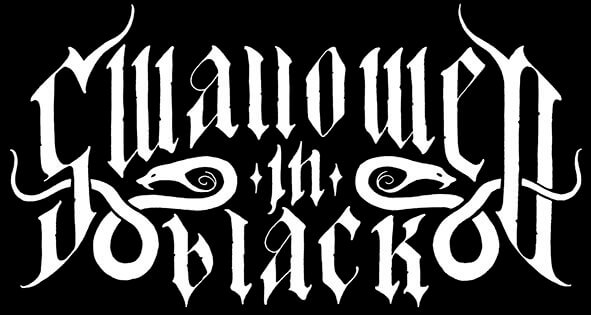“WHETHER PEOPLE LIKE IT OR NOT, THIS ‘OLD WORLD’ IS STILL ALIVE TODAY, NOT JUST THROUGH THE REMAINS AND RUINS BUT ALSO THROUGH US – ITS DIRECT HEIRS – WHO CARRY THIS HERITAGE IN OURSELVES” – ARDRAOS (SÜHNOPFER)
Summoning solemnly the spirit and essence of the past, feverish fourth Sühnopfer full-length ‘Nous sommes d’hier’ defiantly evokes and immortalises the triumph and tragedy of the Middle Ages through a stirring rendition of Baroque Black Metal. Reflecting upon the genesis of this timeless offering of decadent, medieval Black Metal, composer- and executioner-in-chief Ardraos discusses the deployment of art as a means of revisiting and celebrating ancient days and ways; collaborations and inspirations; the convergence of historical and musical passions; resisting the insidious march of modernity; resonances captured in old buildings; the painstaking process of creating a Sühnopfer record; and how the past is always alive.
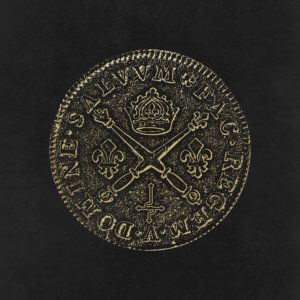 Black Metal in its most refined and idyllic state celebrates tradition, culture, heritage, nature and history whilst simultaneously rejecting the obscenity and vacuity of the modern world. Are these the sentiments or convictions that gave rise to Sühnopfer? And what other feelings or emotions inspire you to create music under this timeless banner?
Black Metal in its most refined and idyllic state celebrates tradition, culture, heritage, nature and history whilst simultaneously rejecting the obscenity and vacuity of the modern world. Are these the sentiments or convictions that gave rise to Sühnopfer? And what other feelings or emotions inspire you to create music under this timeless banner?
“Your words actually correspond to my conception of black metal but, this being very subjective, others may not recognize themselves in it. Sühnopfer’s starting point was first of all the will to create something all by myself and then deliver the most personal version possible of what this musical genre meant to me. After my younger years and the primary influences of bands who musically influenced me at the time, my way of making music and considering certain themes evolved little by little, finally coming through in the albums that I released recently, which are imbued with this rather conservative conception, which forms a whole with history, land, stones, nostalgia, nobility, or even despair.”
Are you using art as a means to revisit, connect with, celebrate (and perhaps even resurrect) long-forgotten days and values? Is ‘’Nous sommes d’hier’ (and Sühnopfer’s music as a whole) more rooted in the past than the present?
“Obviously Sühnopfer’s music intrinsically carries within it a certain glorification of the past through the atmospheres, visuals and themes covered, there’s no doubt about that. As stated previously, my personal interests have progressively developed through the years and have obviously influenced my musical creations. This has finally created a sort of symbiosis between what I enjoyed learning and looking for, and incorporating this into the music and tones I like to produce. These two ‘passions’, historical and musical, are thus intimately connected and express themselves through Sühnopfer. While I certainly draw my references from historical periods or places that have existed, I also try to recreate an imaginary setting based on local legends (so not necessarily on real facts) or imaginary contexts more adapted to some compositions. I do not want to make pure historical renditions, with texts that could be like boring history lessons, but rather to support my inspiration on a set of atmospheres from this local past. Because, whether people like it or not, this ‘old world’ is still alive today, not just through the remains and ruins but also through us – its direct heirs – who carry this heritage in ourselves. We will never be able to make a clean sweep of the past, it will always be buried somewhere; its resurgences or reminiscences are continuously manifesting, and I wanted to breathe them into Sühnopfer.”
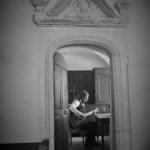 Can the insidious march of modernity be resisted and repelled? Is France at a crossroads today or have you already passed a point of no return? Will the glory of the past ever be reclaimed? Is it still possible in 2024 to connect with ancient, innate values and ways, perhaps through rural living, focusing on family, a simpler way of life, disconnecting from the system and the race to the bottom…
Can the insidious march of modernity be resisted and repelled? Is France at a crossroads today or have you already passed a point of no return? Will the glory of the past ever be reclaimed? Is it still possible in 2024 to connect with ancient, innate values and ways, perhaps through rural living, focusing on family, a simpler way of life, disconnecting from the system and the race to the bottom…
“Of course times have changed for centuries, obviously improving many fields, but they have also changed very quickly since the end of the twentieth century, embracing all spheres of society. But changes don’t always mean improvements. And metaphorically, I hope there will always be some people able to capture the energy coming from our past and breathe it around them when the moment has come. I do not mean to return to living in the Middle Ages, but to take from it the most beneficial values that are so lacking today. That said, I think we could perfectly live without certain aspects of modernity or technology, maybe not in every domain, but we should relearn how to be satisfied with just more simple things.
“I’m not claiming that everything is absolutely bad in today’s modernity, nor am I demanding that we all go back to living in caves without water or electricity, but it is certain that some of the technological or scientific progress has been somehow diverted for ideological purposes to shape our current society. History proves to us that reversals of all situations are possible, either over very long periods or during lightning revolutions. But, for society to change as a whole, everyone must already work on themselves and their relatives individually.
“Our problem today is that French people have forgotten who they were and where they came from, and what their ancestors had built and accomplished for centuries. Modern society has locked them into easy comfort, consumption and entertainment, and they no longer know how to think for themselves or consider things firmly, their existence is just fully remote-controlled. Some people don’t even understand how to live outside their downtown city lifestyle, and for this reason the recent confinements linked to Covid showed them that they were completely wrong and that they would not survive more than a few days in case of a more serious crisis. As you said, refocusing on your family, raising your children properly while protecting them from the insidious aspects of modernity, living in the countryside with a better connection to nature and heritage, are principles that I try to uphold and apply at my level, without trying to impose it on anyone.”
 On the deeply reverent and nostalgic ‘Nous sommes d’Hier’ it feels like you are grieving intensely for times gone by. Is there any specific age or era from the past that you are longing for and revisiting? If so, what is it about this period that calls to you so strongly across the centuries and fills your soul with so much passion and pride?
On the deeply reverent and nostalgic ‘Nous sommes d’Hier’ it feels like you are grieving intensely for times gone by. Is there any specific age or era from the past that you are longing for and revisiting? If so, what is it about this period that calls to you so strongly across the centuries and fills your soul with so much passion and pride?
“Let’s say that I have always been attracted by a fairly broad period ranging from the 11th to the 18th century, in other words the Middle Ages, the Renaissance and the Baroque period preceding the industrial revolution. The traces and vestiges left by the medieval period and which remain today, the melodies composed by the troubadours or great composers and which have reached us, certain religious practices, here are some elements of the base which unites the past and the present. There’s always this very obscure religious aspect that interests me, with the relationship to death and the afterlife, for example, the history and legends of some places, and of course the chivalrous and noble aspect of ancient practices.”
Why do you think it is that France (compared to other nations) produces such a disproportionately large quota of Black Metal teeming with revisionist, nationalist or patriotic sentiment? Do these emotions reflect a general appetite for revolution in French society or have most minds been captured by the new world order?
“I obviously think that this is linked to the intrinsic history of our country, the multiple wars and other regime changes it has undergone, and certainly to its status as a great-powered country which has somewhat disappeared today. But this only reflects the state of mind of certain black metal bands who are outside of society’s classic currents of thought. Even if there is currently a return of patriotic and communitarian feeling within the French population, I’m not sure that this will translate into a profound change in our society in the future.”
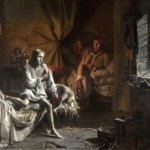 You incorporate the influence of select classical composers into a rich tapestry of Baroque Black Metal and this is evident on ‘’Nous sommes d’hier’ where ‘D.S.F.R.’ borrows from 17th-century French composer Marc-Antoine Charpentier and ‘Derniers Sacrements’ draws inspiration from Luigi Cherubini. What is it about classical music that appeals to you so much and, if these influential characters were alive today, do you think they would appreciate (or maybe even create) Black Metal?
You incorporate the influence of select classical composers into a rich tapestry of Baroque Black Metal and this is evident on ‘’Nous sommes d’hier’ where ‘D.S.F.R.’ borrows from 17th-century French composer Marc-Antoine Charpentier and ‘Derniers Sacrements’ draws inspiration from Luigi Cherubini. What is it about classical music that appeals to you so much and, if these influential characters were alive today, do you think they would appreciate (or maybe even create) Black Metal?
“The parts that I incorporated into Sühnopfer’s tracks have first of all a particular resonance and meaning because they enter into the themes addressed by the album. Originally, the first theme called ‘Domine Salvum fac Regem’ was quite simply the national anthem practised in the kingdom of France under the old regime. It comes from ‘motets’ used in the local liturgy (prayer for the King during masses) before becoming very popular in the form given by Charpentier and other composers under Louis XIII and Louis XIV. Sühnopfer’s title itself evokes this past by metaphorically referring to the death of royalty, imagining what might be the return of powerful ghosts from that era.
‘Derniers Sacrements’ opens and closes with Sühnopfer’s enhanced version of ‘Requiem in C minor’ composed by Luigi Cherubini in 1816. It was originally premiered on January 21, 1817 at the Basilica of Saint-Denis for a ceremony commemorating the 24th anniversary of the execution of Louis XVI. This entire track revolves around the end of the royal family during the French Revolution, and particularly around the death of Louis XVII, son of Louis XVI, in a ‘Temple’ prison on June 8, 1795, at the age of ten. His death happened after he spent three years locked in secret in a dark dungeon, without any hygiene or care. This track alternates darkened riffs with brighter passages, based on the last moments and words of this child-King, which were precisely transcribed.
“More generally, classical music was part of my musical learning, and I obviously appreciate the incredible sense of composition and harmonies developed by some composers. If they came back today, they would certainly compose in the same way and virtuoso musicians would still be needed to perform their works. Certain tones could undoubtedly be closer to black metal, but not sure they would identify with it.”
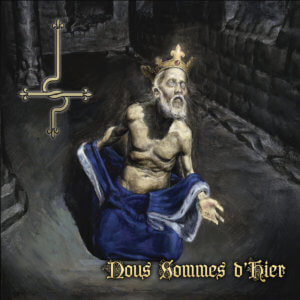 Marking the end of the House of Bourbon’s two-centuries-plus reign, the imprisonment and death so young from tuberculosis of Louis XVII following the public execution of his parents (aged 38 and 37) is a harrowing story and one that perhaps shows the folly of viewing the past through rose-tinted glasses. Obviously, these were terrible times. It reminds us too that no crown, cloak or title can save a man, woman or child from their ultimate fate: death. Are you hinting at this with the painting on the fabulous front cover of ‘Nous sommes d’hier’, which depicts a fallen monarch in a vulnerable and pitiful state?
Marking the end of the House of Bourbon’s two-centuries-plus reign, the imprisonment and death so young from tuberculosis of Louis XVII following the public execution of his parents (aged 38 and 37) is a harrowing story and one that perhaps shows the folly of viewing the past through rose-tinted glasses. Obviously, these were terrible times. It reminds us too that no crown, cloak or title can save a man, woman or child from their ultimate fate: death. Are you hinting at this with the painting on the fabulous front cover of ‘Nous sommes d’hier’, which depicts a fallen monarch in a vulnerable and pitiful state?
“There are several hidden meanings in this cover, the main character stands in a ruined church, which could be interpreted as his last sanctuary after his forfeiture, his posture evokes the iconography of Job (since the album title is linked to this passage from the Old Testament). He finds himself naked on the top of his body like Job, but the rag that remains on him is a large royal cape. He wears a crown to make it clear that he is a fallen king, his imploring posture and the ray of light that illuminates him for a chiaroscuro evokes a weak hope of ‘rebirth’ distilled through the songs of this album.”
Speaking of kings, French Black Metal royalty makes an appearance on ‘Sermon sur le Trépassement’, with none other than Vindsval delivering some leads and backing vocals. How did this collaboration come about and what was the experience like? Are you a fan of Blut Aus Nord? Would you agree that ‘The Work Which Transforms God’ is a landmark release in the history of Black Metal, or do you have a different personal favourite?
“Well, I think I’ve had a little luck on this; being signed on the same label helped, but I also knew that Vindsval appreciated Sühnopfer since ‘Offertoire’. So, I directly asked if he would be interested in making an appearance on Sühnopfer’s new album, and he accepted. Then I thought about how he could possibly enhance a song, and ‘Sermon sur le Trépassement’ seemed to be the perfect one for him to insert his typical choirs and some guitar leads at the end of the track. After several tries, he found the right way for the choirs, and recorded the guitar leads in one shot. His parts have obviously brought some magic to this track, and added a great new dimension.
“I’m obviously admiring all the work he accomplished with Blut aus Nord, with a more dissonant twist and quite incredible terrifying atmospheres most recently, but on a personal level I think I remain rather nostalgic for ‘Memoria Vetusta II’.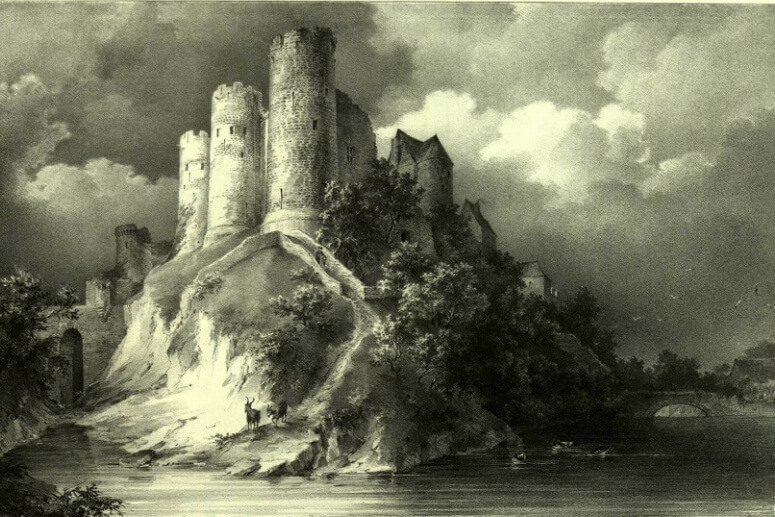 I can only imagine the Sühnopfer compositional process as being a particularly painstaking, meticulous and challenging one. How important is it to be in the right physical setting and mental frame of mind when writing music? Also, while obviously it is impossible to not deploy modern techniques and appliances, do you try to use old analog or acoustic equipment and / or methods as much as possible to attain a genuinely ‘old’ and authentic result?
I can only imagine the Sühnopfer compositional process as being a particularly painstaking, meticulous and challenging one. How important is it to be in the right physical setting and mental frame of mind when writing music? Also, while obviously it is impossible to not deploy modern techniques and appliances, do you try to use old analog or acoustic equipment and / or methods as much as possible to attain a genuinely ‘old’ and authentic result?
“As my music is a work of several phases (composition/recording/arrangements), you must above all have some free time and a clear mind to get involved in each of them, especially for the composition work, because the inspiration cannot be ordered or planned. For the recording phases, you obviously have to be in good physical shape, especially for the drum parts which I have to rehearse for several months before entering the studio. All these phases require a lot of rehearsals and you need to keep yourself motivated throughout the process, which takes several years.
“I recorded my first demos with a 4-track tape recorder, and I then used this same somewhat obsolete equipment to produce the mock-ups of my albums up to ‘Offertoire’. But my way of composing and the technical requirements that I imposed on myself mean that today this type of equipment would no longer be suitable for my work. The kind of black metal that I produce must be intelligible with regard to the multiple lines of instruments which intertwine with each other, and I certainly could not have a sufficiently satisfactory result with material which would only give a demo tape result. This would have been possible if I played a little more basic music that wouldn’t require going into a lot of production details. To my mind, my work remains authentic because no part of the instrument I played nor my vocals have been altered or modified by a computer.”
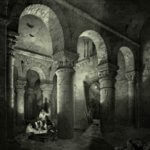 There’s something of a curveball at the end of the album when you reimagine the 1968 song ‘Le Bal des Laze’, which was originally performed by French singer Michel Polnareff – the first cover to appear on a Sühnopfer record. Why did you decide to rework this particular song and how does it tie in with the overall spirit and narrative of ‘’Nous sommes d’hier’?
There’s something of a curveball at the end of the album when you reimagine the 1968 song ‘Le Bal des Laze’, which was originally performed by French singer Michel Polnareff – the first cover to appear on a Sühnopfer record. Why did you decide to rework this particular song and how does it tie in with the overall spirit and narrative of ‘’Nous sommes d’hier’?
“I was already listening to this song when I was a child, my mother had a lot of LP records of this artist, and it marked me musically. Besides, this song was banned in France when it was released because of its lyrics (it speaks about a commoner in love with a noblewoman, who in rage kills her fiancé and will be hanged for it – the first words of the song are ‘I will be hanged tomorrow at dawn’ – a little bit too violent for 60s radio!). A few years ago, I had fun covering this track with an acoustic guitar, and I thought to myself: why not make a black metal version of it? The tonalities of the song and its rather funereal theme seemed to me to be perfectly suited to the universe of Sühnopfer. And all organ parts on the original track could be replaced by guitar lines, arranging them as I usually do for my own compositions, I just changed the tonality so it could fit my clean voices. It was not initially planned to appear on the album. The album was intended to end with ‘Derniers Sacrements’. But once recorded, I couldn’t see myself not releasing this song at the same time as the rest of the work.”
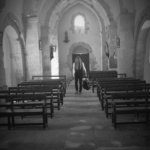 The tastefully-curated gatefold LP version of the album includes photos of you inside an old church building. What is the significance of this place and are you attracted to old / ancient churches and buildings in general? They seem to emanate a character that is totally at odds with modern architecture and the modern world…
The tastefully-curated gatefold LP version of the album includes photos of you inside an old church building. What is the significance of this place and are you attracted to old / ancient churches and buildings in general? They seem to emanate a character that is totally at odds with modern architecture and the modern world…
“I took these photos in the roman church of my village, which is attached to my house (which also was a former monastery). These places have a particular atmosphere and resonance for me, not only because of their authentic architecture but, as I said previously, by the trace that our ancestors left with these constructions, which reflect an austere and glorious past.”
We’ve discussed the past and the present, but what of the future? ‘’Nous sommes d’hier’ stands as a lasting legacy to Sühnopfer as a unique and individual Black Metal force and presumably you are proud of what you have accomplished with this record. I know you have been very focused on family life recently but have your energy / creativity levels been replenished and will you be turning your attention to new music any time soon, or what comes next for Sühnopfer?
“For the moment we’ll continue to promote this new album with the label (interviews, playthrough videos, etc.). I’m of course proud of each release I’ve done because I put the best of myself into it each time. And after each release, I always wonder if I will be able to do as well or not next time. If for whatever reason I had to stop after ‘Nous Sommes d’Hier’, it wouldn’t be bad timing because I’m not yet sure I could reproduce something as good. In any case, it’s going to take me a lot of time to create something new, and I’m not setting any limit on the duration of a future creation. Whether it takes five or ten years, it will be the same for me, I can’t see myself releasing an album that doesn’t entirely meet my expectations. I actually have a job and three children (maybe more in the next few years?) which is very demanding, and I usually start looking for new ideas on the guitar when I have a little free time, and we’ll see where this takes us.
“I’m not going to change the way I make music, but it’s definitely going to take place over a much longer period of time. I also participated in some other projects (Petracorensis, which has just released its first album, and another which will perhaps be released in 2024). I’m also thinking about creating something quite quaint on the accordion, but I don’t know if I will be able to work on it in the years to come. As we say, time will tell!”

